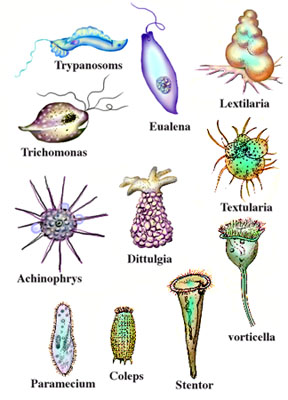 Return
Return
An organism that cannot manufacture all its own nutrients but must feed on organic molecules in the broth that surrounds it. (This assumes that the organism is immersed in an acqueous medium or at least rests on a wet surface; supply of water is essential to protoplasmic life).
Prokaryotes are single-celled organisms that lack a nucleus and that do not have their genetic material organized into chromosomes. They constitute the Kingdom Monera, Which is spilit into two division: the Schizophyta ( traditionally called bacteria ) and the Cyanophyta (formerly known as blue-green algae ). Like algae and higher plants, cyanophytes conduct photosynthesis that results in the release of molecular oxygen.
Earyly prokaryotic fossils are of two types: microscopic remnants of cells and large, layered structures called stromatolites. The cell remnants include nearly spherical forms and filaments constituting chains of cells.


 Return
Return